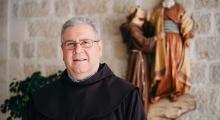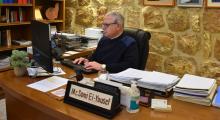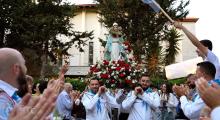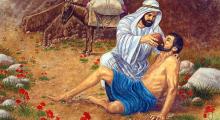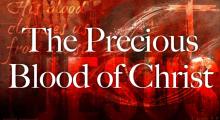Issued by the Catholic Center for Studies and Media - Jordan. Editor-in-chief Fr. Rif'at Bader - موقع أبونا abouna.org
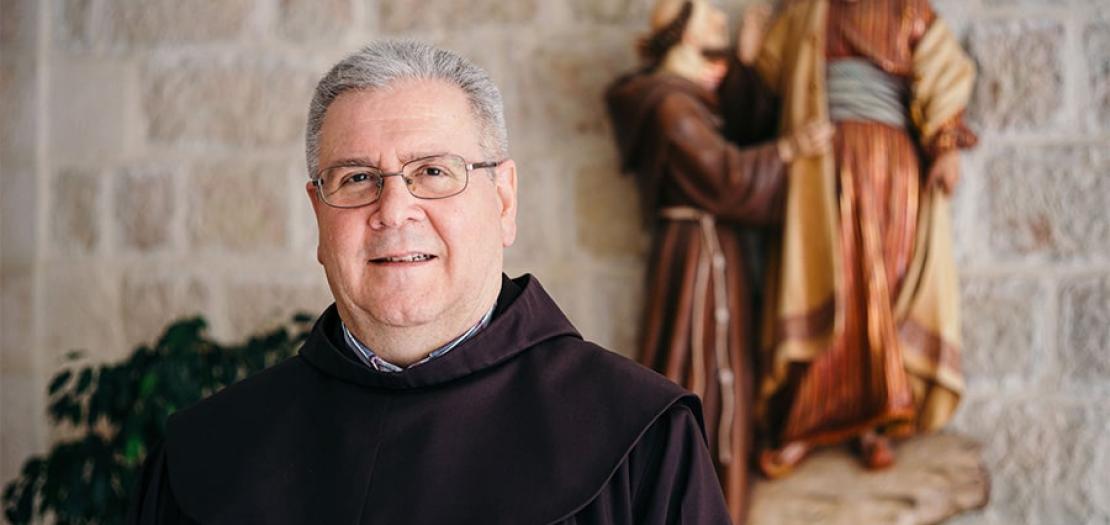
After nine years of service as Custos of the Holy Land, Fr. Francesco Patton concludes an intense and unique experience. Appointed Custos in 2016, he has lived through complex historical events, from the war in Syria, to the pandemic, to the recent resurgence of conflicts, accompanying the Custody through a time of great transformation. In this interview, he tells us what it means to live as a "pilgrim" even with institutional responsibilities, which encounters touched him the most deeply, and what he has learned from this mission that combines fraternal life, spirituality, and diplomacy.
You have often spoken about the importance of feeling like a pilgrim even as a Custos. How do you manage to maintain this spirit in such a public and institutional role?
"I feel like a pilgrim as a human being, as a Christian, as a Franciscan, because the category of the pilgrim is used by Saint Peter and in the Letter to the Hebrews in the New Testament precisely to describe our condition. We are not here on this earth permanently, but only passing through. There are some beautiful Gospel passages, including the one from last Sunday, where it speaks of traveling light. So, the sense of being a pilgrim even when performing an important service is to be aware that you are still just passing through, that you are contributing something, and that your gaze must go beyond the present moment. The pilgrim category is very helpful also to put your service into perspective, in a good way. It doesn't mean doing things with less commitment, but with less anxiety, and with the right perspective: you are not the owner of a service, but you are, as the Latin formula says, pro tempore (temporarily). Someone else did it before you, and someone else will do it after you. In human terms, it helps not to imagine ourselves as overburdened, or more important than we really are. In Christian terms, it helps to live and act by trusting in God."
Amid the many tensions and fragilities in the Holy Land, what was the episode that touched you most deeply?
"There are many episodes. I was deeply moved by the faithfulness of the two friars who remained in the Orontes Valley when ISIS and Al-Qaeda were present. They stayed because they knew they were shepherds, and not hired hands, using the words from Chapter 10 of Saint John. Their availability to give their lives was not hypothetical, but concrete in a very risky context. I was also struck by how important the holy places are to Christians who may only be able to visit once in their lives. In Brazil, I saw people who saved a little money each month for 10 or 15 years just to visit Nazareth, Bethlehem, and the Holy Sepulchre. Or a Christian from Syria visiting the Sepulchre, and bursting into tears from the emotion. And then the value of the schools: even though we are a small reality, keeping them open means offering a small sign of a possible future, because there people live together, and are educated to coexistence among different ethnicities, cultures, and religions. Finally, I was negatively affected by seeing the growth of intolerance, extremism, and the ideological manipulation of religion for political purposes. That made, and still makes, me suffer."
You have always emphasized the value of listening. What has listening taught you over these years, among friars, pilgrims, and local communities?
"The first important school for me was that of the friars, due to their internationality and multiculturalism. Living in such a context constantly forces you to step out of your own culture, and into another’s, and vice versa. It is a continuous exchange. Ever since I was a child, I was fascinated by imagining what was beyond the mountains surrounding my small village, and in the Holy Land I rediscovered that gaze on the world in my relationships with the three main components: local faithful, migrant workers, and pilgrims. The local Christians are a suffering minority, in a logic of resistance that I hope is not of resignation, but of new life. The migrant workers helped me grasp how God guides history in ways different from what we imagine. And the pilgrims, coming from all over the world, meet other Christians from every part of the globe. Here, they rediscover the universality of the Church, its Pentecostal origin, which they often cannot experience in their own countries. It is an immense richness."
What have you learned, on a personal and human level, during these nine years in the Holy Land?
"I think I have learned a lot. When you live in a markedly international and intercultural context, you constantly have to step out of your own culture, to enter someone else’s. It is an experience of continuous exchange. I really like an expression of Don Tonino Bello: the conviviality of differences. It means that being from different places should not lead to conflict, but to the sharing of riches and values. I saw this concretely in occasions like the feast of Saint Anthony in Jaffa, where faithful from every origin, Arabs, Filipinos, Indians, Africans, Latin Americans, Europeans, pray together, and then share dances, songs, and food. It is a powerful symbol of what the Church of tomorrow could be."
Does praying in the places where Jesus walked change anything? How has his spirituality been transformed?
"My prayer has deepened. Contact with the places has increasingly convinced me of the value of the Incarnation. The sanctuaries, with their physicality, bring faith back into a concrete, existential realm. They are a great help in avoiding a disembodied, intellectualized Christianity. They are an antidote against religious rationalism and intellectualism. And they also help us to understand the religiosity of the people. Intellectuals love reasoning, but people love to touch. They love to kiss a stone, smell the perfume of myrrh, see the olive trees in Gethsemane, the grotto of Bethlehem, Calvary, and the empty tomb. Popular religiosity is much closer to the mystery of the Incarnation than that of professional theologians."
Christians in the Holy Land live a difficult and minority reality. What message of hope do you feel you can offer them?
"To local Christians, I have always said, especially to young people, to cultivate their identity as Christians of the Holy Land. They must not focus on ethno-political identities, but on a deeper identity: being custodians, with us, of the holy places. Many sites have been recovered thanks to the local Christians who preserved their memory. The holy places are an essential part of their identity. I have suggested to parish priests to bring the young people there, to tell the Gospel in the places of the Gospel. The holy places belong to them. Being a Christian in the Holy Land is a vocation and a mission. If God lets you be born here, He is calling you to be light and salt, precisely because you are a minority and the context is difficult. And Jesus reminds us that salt which loses its flavor is useless."
Looking to the future, what direction do you dream for the Custody of the Holy Land?
"The Custody must become increasingly international, faithful to the intuition of Pope Clement VI in 1342. During these nine years, I especially invited the Franciscan provinces of Asia and Africa to send friars. Today the Custody is no longer only European or American, but has expanded. And it must continue to expand. In a land where people fight over every square meter based on ethnicity and culture, being able to live together as friars from different countries, cultures, and languages is a concrete sign that coexistence is not only possible, but deeply enriching."
If you could go back and talk to yourself as soon as you landed in Tel Aviv in 2016, what would you say to him?
"I would say to myself: you are crazy. Because it takes a good dose of madness and recklessness to throw yourself into such a complex context, with so little knowledge of the local reality as I had then. But maybe it is better that way, because it also meant arriving here with fewer prejudices, and with more openness and, necessarily, with more trust in God than in myself. It is hard to imagine in advance what this kind of service really means. When I arrived, it was the worst moment of the war in Syria, then came COVID, then another war. I hope that now the various fronts can be closed, and that there may be a time of peace. But if mentalities do not change, there will only be truces, not real peace. Peace requires mutual acceptance between the two peoples who have been in conflict for decades, and the overcoming of ideological readings of history, geography, and even of the Bible. It would be necessary to teach coexistence in schools, instead of an ideology that only generates fear, anger, and resentment. Neither of the two peoples must leave, and both must be able to live together in peace. If both were able to overcome mutual closure, the next generations could finally grow up in peace, without fear and without anger."



